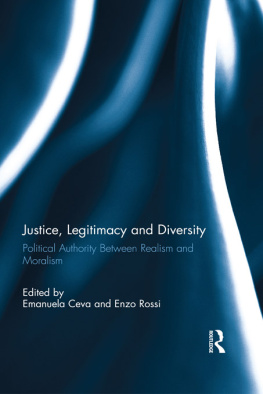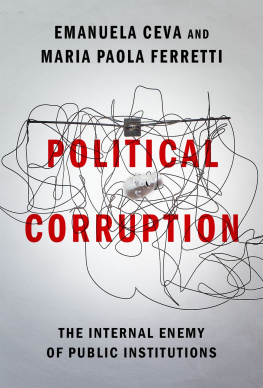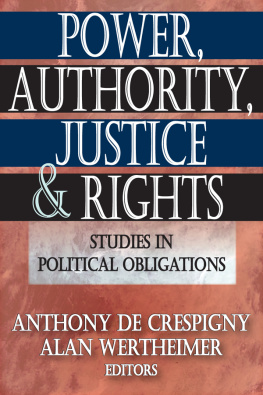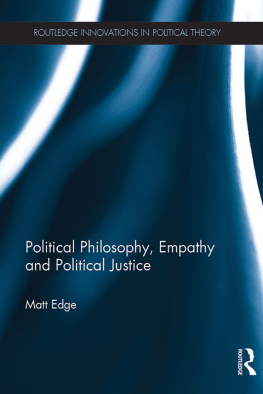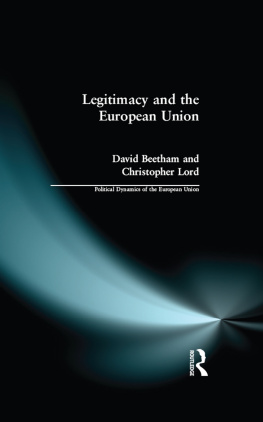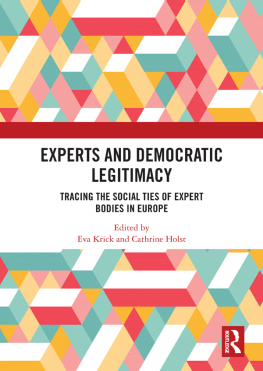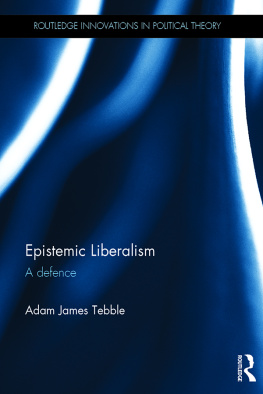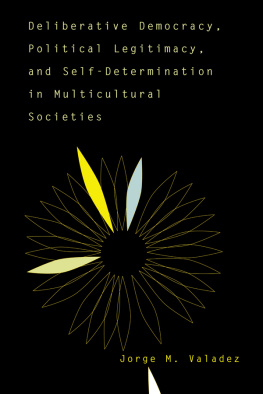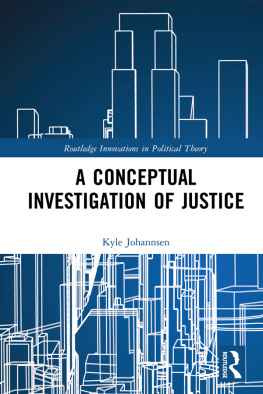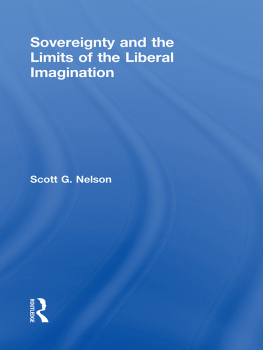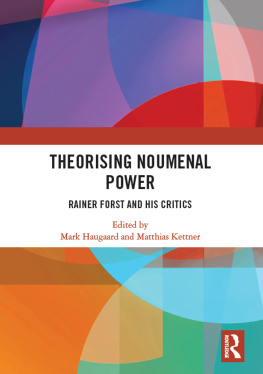Justice, Legitimacy and Diversity
Most contemporary political philosophers take justicerather than legitimacyto be the fundamental virtue of political institutions vis--vis the challenges of ethical diversity. Justice-driven theorists are primarily concerned with finding mutually acceptable terms to arbitrate the claims of conflicting individuals and groups. Legitimacy-driven theorists, instead, focus on the conditions under which those exercising political authority on an ethically heterogeneous polity are entitled to do so. But what difference would it make to the management of ethical diversity in liberal democratic societies if legitimacy were prior to or independent from justice?
This question identifies a widely underexplored issue whose theoretical salience shows how the understanding of what constitutes the primary question of political philosophy has a deep impact on how practical political questions are interpreted and addressed. What difference would it make, for example, whether the difficulties concerning the safeguard of human rights were couched in terms of the justice or of the legitimacy of the documents and treaties sanctioning their implementation? How should the issue of the quality of democracies be addressed whether one assigned priority to the justice or legitimacy of democratic institutions? Addressing these and other topical questions, the book offers a new theoretical angle from which to consider a number of pressing social and political issues.
This book was previously published as a special issue of the Critical Review of Social and Political Philosophy.
Emanuela Ceva is Assistant Professor of Political Philosophy at the University of Pavia. She has published on themes of procedural justice, pluralism and respect for dissenting minorities and she is completing a monograph on value conflicts in politics.
Enzo Rossi is Senior Research Fellow in Social Philosophy at the University of Wales, Newport. His published work focuses mainly on the theoretical foundations of liberal democracy, with particular attention to problems of legitimacy and realism. He is completing a book on the liberal political tradition.
First published 2013
by Routledge
2 Park Square, Milton Park, Abingdon, Oxon, OX14 4RN
Simultaneously published in the USA and Canada
by Routledge
711 Third Avenue, New York, NY 10017
Routledge is an imprint of the Taylor & Francis Group, an informa business
2013 Taylor & Francis
This book is a reproduction of Critical Review of Social and Political Philosophy, vol. 15, issue 2. The Publisher requests to those authors who may be citing this book to state, also, the bibliographical details of the special issue on which the book was based.
All rights reserved. No part of this book may be reprinted or reproduced or utilised in any form or by any electronic, mechanical, or other means, now known or hereafter invented, including photocopying and recording, or in any information storage or retrieval system, without permission in writing from the publishers.
Trademark notice: Product or corporate names may be trademarks or registered trademarks, and are used only for identification and explanation without intent to infringe.
British Library Cataloguing in Publication Data
A catalogue record for this book is available from the British Library
ISBN13: 978-0-415-59729-6
Typeset in Times New Roman
by Taylor & Francis Books
Publishers Note
The publisher would like to make readers aware that the chapters in this book may be referred to as articles as they are identical to the articles published in the special issue. The publisher accepts responsibility for any inconsistencies that may have arisen in the course of preparing this volume for print.
Contents
Emanuela Ceva and Enzo Rossi
Gerald Gaus
John Horton
Enzo Rossi
Glen Newey
Emanuela Ceva
Valeria Ottonelli
Simon Cbulea May
Sebastiano Maffettone
Emanuela Ceva is Assistant Professor of Political Philosophy at the University of Pavia. She has published widely on themes of procedural justice, pluralism and respect for dissenting minorities. Her most recent publications include articles in Politics Philosophy and Economics, Political Studies and the Journal of Applied Philosophy . She co-edited the book Diversity in Europe. Dilemmas of differential treatment in theory and practice (Routledge 2010) and is completing a monograph on value conflicts in politics.
Gerald Gaus is James E. Rogers Professor of Philosophy at the University of Arizona, where he directs the program in Philosophy, Politics, Economics and Law. His most recent book is The Order of Public Reason , published in 2011 by Cambridge. Along with Fred DAgostino, he is coeditor of the forthcoming Routledge Companion to Social and Political Philosophy.
John Horton is Professor of Political Philosophy at Keele University, UK. He is the author of Political Obligation (2nd edn, 2010) and has published extensively on toleration and a wide range of issues in contemporary political theory.
Sebastiano Maffettone is Full Professor of Political Philosophy at the Luiss University, Rome. He has published on themes of international political philosophy, liberalism, human rights, bioethics and business ethics. He is editor of the Italian journal Filosofia e questioni pubbliche .
Simon Cbulea May is Assistant Professor of Philosophy at Florida State University. His present research concerns conflicts of moral and religious conviction in liberal democratic politics. He has published articles on moral compromise, political legitimacy, and moral duties in Philosophy and Public Affairs and Ethics .
Glen Newey is Professor of Political Theory at the Universit libre de Bruxelles. He is the author of Virtue, Reason and Toleration (Edinburgh 1999), After Politics (Palgrave 2001) and Hobbes and Leviathan (Routledge 2008) and numerous articles on topics concerning modern liberalism, such as toleration, political morality, pluralism and political obligation. During 200810 he was Visiting Research Fellow at the Helsinki Collegium for Advanced Studies, where his research project focused on the relation between toleration and security.
Valeria Ottonelli teaches Political Philosophy and Public Ethics at the University of Genova. She has been working on immigration and global justice and on the normative theory of democracy. She recently published a book on the procedural justification of democracy ( I principi procedurali della democrazia , Bologna, 2012).
Enzo Rossi is Senior Research Fellow in the Social Ethics Research Group at the University of Wales, Newport. Most of his published work concerns the accommodation of diversity in liberal democracies, with particular attention to issues of legitimacy and realism. He edited (with E. Bardone) a collection on multiculturalism ( Oltre le culture , Pavia 2004) and is currently completing a book on the liberal political tradition.
Emanuela Cevaa and Enzo Rossib
aDepartment of Political and Social Sciences, University of Pavia, Pavia, Italy
bSocial Ethics Research Group, Faculty of Education & Social Sciences, University of Wales, Newport, UK
That a polity should be, in a basic sense, legitimate and just is hardly a disputed stance among political theorists. More precisely, the task commonly considered crucial to liberal political philosophy of justifying the social order to all those who are subjected to it is standardly seen to embody both elements of justice and of legitimacy (Nagel 1991, Estlund 2007). However, there is little by way of consensus regarding the distinction between the two terms. Some draw a connection between them by explicitly presenting legitimacy as a criterion of minimal justice (Hampton 1998, Buchanan 2002), or in fact by considering justice as what specifies the standards of legitimacy, in the sense that the only authoritative orders a state may issue are just ones (Rawls 1971). Other theorists have disentangled justice and legitimacy altogether by construing both concepts as separate components of the answer to a wider question concerning the overall justification of the social order and of political authority, e.g. by arguing that a liberaldemocratic political order calls for a specific kind of interaction between justice and legitimacy, where neither is a by-product of the other (Simmons 1999).

